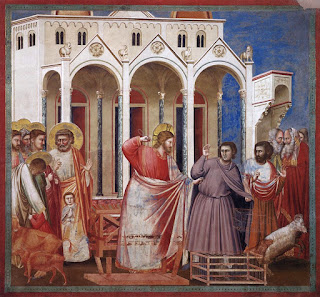In Our Right Minds
Reflections on Philippians 2.1-12
RCL Palm Sunday B
28 March 2021
Holy Trinity Anglican Cathedral
New Westminster BC
In April of 2003 I turned fifty. As many other people have no doubt done before me, I took stock of my life thus far. Professionally I had done well: a full professor with tenure, opportunities to travel, significant committee assignments and work that still interested me.
On the personal side of things, however, I felt a little unease. Paula and I had married later than either set of parents. By the time my father was fifty, for example, I was in seminary, my sister married with the first grandchild on the way and my father had retired from his first career with the U.S. Air Force and was embarked on the first of two subsequent mini-careers.
Here I was, the father of three children who were twelve, fourteen and sixteen and going through the biochemical changes of adolescence, just as I was beginning the biochemical changes of later middle age. I remember saying to Paula, ‘It’s no wonder it seems like a madhouse around here. We’re all under the influence of some chemical or another. None of us are in our right minds!’
What I said as a joke seventeen years ago is still true. Being alive these days has a certain almost deranged character to it. We know, despite all the nay-sayers, that climate change is real and that human activity contributes to its severity. But we struggle to exercise the communal discipline and political will to make the necessary changes to protect our world for future generations.
We know that we are all made in the image of God and are held precious by that same God. But, despite our best intentions, we all have moments when we lapse back into ancient, almost genetic. ‘we/they’ attitudes when justice, dignity and full inclusion mean relinquishing our privileges in order to make room for others.
Not being in our ‘right mind’ appears to be a sadly regular experience for all of us. But it is not a state of mind in which God is willing to let us linger or stagnate.
The third-century theologian, Irenaeus of Lyon, wrote that ‘the glory of God is a human being fully alive’. He might well have added ‘ . . . and a fully alive human being lives in their right mind’. Irenaeus did go further to point out to his readers that Jesus of Nazareth is just such a fully alive human being, one who is always in his right mind because he taps into that image of God at the core of his being.
The apostle Paul, in his letter to the Christian community in Philippi, anticipates Irenaeus in describing Jesus as this unique embodiment of what it means to be fully human, fully alive, always in one’s right mind. Paul won’t let the Philippians off the hook because he loves them so deeply. They might want to wriggle off the hook by saying something like this: ‘Well, Paul, Jesus was, after all, the Son of God. What can we mere mortals be expected to do and to be?’ They might want to do the first-century equivalent of responding to gun violence by offering ‘thoughts and prayers’ by talking about how following Jesus is an aspirational goal rather than one that requires hard work and personal transformation. But Paul won’t let them squirm away that easily from owning up to who they are as well as who they are called to become.
In a few short verses Paul gives us the means to identify when we’re in our right mind and when we are deluded.
- Do we regard the well-being of others as the stimulus for our actions rather than being motivated by selfish ambition or conceit? Then we’re likely in our right mind, our Christ-like mind, even when we fall short.
- Do we act in the best interests of the whole community rather than pursuing self-interest or partisan advantage? Then we’re likely in our right mind, our Christ-like mind, even when we fall short.
- Do we strive to follow the model of Christ in each and every dimension of our lives? Then we are likely in our right mind, our Christ-like mind, even when we fall short.
Being right-minded, being Christ-minded, requires discipline and life-long commitment even as it exposes us to many risks, known and unknown. But, in the end, it is the only way to be fully alive.
Today we renew our commitment to strive to live in our right mind despite all that distracts us, confounds us and betrays us. Should we find ourselves drifting from the path, we need only glance at the simple palm crosses that grace our homes and workplaces. Their humility, leaves folded together in the shape of the symbol of Christ’s obedience and sacrifice, will awake in us the example of our Servant Lord, lead us to life in its fullness and restore us to our right minds.


